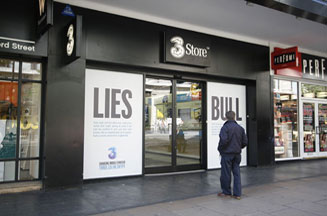
Mobile operator 3 has tried to set itself up as a fresh-thinking brand that fights the consumer's corner. It has been out-spoken on roaming costs and is calling for a reduction in contract termination rates. It has also heavily promoted free internet voice calls via Skype, using the strapline 'Changing mobile forever'.
However, critics have dismissed the company's vociferousness on industry matters, and reliance on other companies' products in its marketing activity as part of a strategy for the brand to differentiate itself from stronger rivals.
A recent campaign - the first for 3 by agency Glue - acknowledged that people are sceptical of claims made by mobile brands in general, and by 3 in particular. The ads stated that its offer of free Skype calls forever was 'no bull', and emphasised its benefits for making international calls. Subscribers have also been encouraged to promote 3 through their social media networks with the offer of £5 cash payments when friends sign up.
While rivals have embarked on more ambitious brand activity, 3 has been focusing on value. With Orange and T-Mobile planning to merge, Vodafone launching a fresh brand strategy, and O2 tapping into family and youth markets, it faces a tough task.
We asked Sam Noble, executive planning director of Iris Worldwide, who has worked with T-Mobile and Sony Ericsson, and Chris Harris, the managing director of Leagas Delaney, who has worked with LG Electronics, what 3 can do to build its market share.
Sam Noble executive planning director, Iris Worldwide
On paper, 3 has its work cut out in the extremely competitive UK operator market, particularly with the advent of the 'big three'.
Lack of scale not only makes it a vuln-erable commercial entity and means its marketing spend is smaller, it also has serious implications in terms of percep-tions of the brand. The questions 'which mobile network are you with?' and 'what are they like?' often crop up in consumer conversations, but '3' and 'fantastic' are rarely the answer.
It's also hard to know what the brand represents. Is it the innovator? Is it the value choice? Is it entry level? Is it mass market? Is it youth? Some of the funda-ment-als about its role, purpose and core audience still seem unclear.
The optimist in me feels that 3 could be a consumer proposition whose time has come. The market needs a credible challenger brand to champion the consumer experience while the other players all blend into one woolly brand generic based on how we're all better off when we communicate. Moreover, the rise of the smartphone plays well to 3's focus on mobile internet.
Remedy
- Take the vacant consumer champion role in the market. Portray the compet-ition as bloated, faceless, technology-driven corporates, and position 3 as being interested in helping real people.
- Stop worrying about marketing, and focus on customer experience to bec-ome the smart choice for discerning consumers. Think First Direct.
- Focus on helping smart people get more out of smartphones. It's where the value is and where the market is moving. Make a real service proposition while the other operators just try to flog us more content and services.
Chris Harris managing director, Leagas Delaney
I love what 3 was trying to do when it launched, but I never bought in. That was the problem with that wave of techno-logical possibilities and innovations that were thrown up by 3G - they were dead clever, but was 3 trying to sell what could be done, rather than packaging up an identified consumer need?
According to the blurb on Glue's website, the most recent marketing campaign for 3 is built on the insight that people are 'highly sceptical of big claims by brands (especially telcos)... and sceptical of 3 and what they stand for'. The agency's solution seems to be an umbilical attachment to Skype in an effort to convince us to believe in the promise of 'free calls forever'.
While 'free' is now a valid pricing strategy, it works when the provider is delivering genuine value to attract consumers who then pay for other things, or become a community others will buy into. In this case, 3 is relying on Skype to deliver. Where is value added that will attach to the brand? It doesn't feel like a long-term strategy.
Remedy
- Even low-cost brands need to be loved. In my opinion, for example, Ryanair will learn that, given a choice, people will use easyJet because it's nicer.
- Start from what your consumers are like and what they want. I think we will find that most of them are very happy with their mobile life, so why go 'changing mobile for ever'.
- Make me love 3, not Skype.
- Create value in the brand. The first thing you see on the 3 website is, 'Become a free agent for 3 and start making money'. Communications are wonderful, and making it easier and cheaper is wonderful - celebrate it, don't devalue it.

